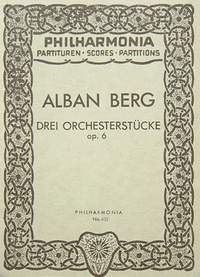Originally posted by Beef Oven!
View Post
Berg, Alban (1885-1935)
Collapse
X
-
I've been listening to the Berg Three Pieces op 6 for over 40 years and though it's one of my my favourite works, I still find it a highly complex listen so looking forward to settling down to read this. Thanks tsOriginally posted by teamsaint View PostThis looks interesting and well researched, but I haven’t read it yet, so can’t vouch for it.
https://www.opusklassiek.nl/componis...erglecture.htm "The sound is the handwriting of the conductor" - Bernard Haitink
"The sound is the handwriting of the conductor" - Bernard Haitink
Comment
-
-
I get to about 30 years, and I still listen to it almost fortnightly. I still get different and new things with every listen.Originally posted by Petrushka View PostI've been listening to the Berg Three Pieces op 6 for over 40 years and though it's one of my my favourite works, I still find it a highly complex listen so looking forward to settling down to read this. Thanks ts

Comment
-
-
I have this work - it's not that difficult to play: there are a number of lingering passages in it besides the slow second subject, but many professional pianists tend to rush through the whole thing, making it seem much more virtuosic than I think it actually should be presented as being.Originally posted by antongould View PostI see no mention here of his Op. 1 the piano sonata … which I have loved these many years and I am listening to now awaiting the fall of the Hangers ….
Comment
-
-
Six years after my post on this thread I tried again with the Chamber Concerto this afternoon and I still fail to get a handle on it. One day, perhaps...Originally posted by Petrushka View Post
Afraid to say, that I find the Chamber Concerto very difficult to 'get'. It hasn't 'clicked' with me in 40 years and I'm doubting if it ever will. Not heard it for a long while so need to try again."The sound is the handwriting of the conductor" - Bernard Haitink
Comment
-
-
I am minded of Boulez's remark on this work: "Like an ice BERG two thirds of it are under water, hidden, with only one third of it above".Originally posted by Petrushka View PostSix years after my post on this thread I tried again with the Chamber Concerto this afternoon and I still fail to get a handle on it. One day, perhaps...
It's probably my favourite work of this composer, rich in harmony and contrapuntal complexity, with a wealth of thematic cross-referencings that are not too hard to cotton on to once one has heard it a few times. But I'm not surprised the Chamber Concerto raises problems for the listener, despite the ofttimes familiar idiomatic glance backs to the past - Unlike Schoenberg's conscious simplification of idiom after the thematic density of works such as his own First Chamber Symphony - a work to which this one has similarities in its manner of working things out - Berg seems to have felt his more pre-atonal referencing harmonic leanings (lots of semi-resolving triads making themselves obvious) allowed for more elaboration in the development. Initially follow the more obvious thematic leads while treating less immediately identifiable layerings in the unfolding textures as secondary, or decoration, because in my experience the latter do reveal themselves in relation to what may seem primary considerations on first or even second acquaintance to make for a remarkably rich listening experience, eventually, if you stick with it!
Comment
-
-
I found the Chamber Concerto hard going to start with but it has grown on me and now I think it's his most satisfying work except for the Lyric Suite which I think will always be my favourite. I should add I've never cared for the Violin Concerto nor either of the operas, though I accept that they are his most important works and probably the two most important operas of the century.
I found listening to different interpretations of the concerto helped; knowing that musicians as different as Barenboim, Zukerman, Uchida and Richter all thought it worth working at , was an encouragement.
Comment
-
-
It's more the other way round for me: the instrumentation poses no problems but the structure is very difficult to grasp and its now getting close to 50 years since I bought the Boulez/Barenboim/Gawriloff/BBCSO recording in February 1976 and I still can't crack it!Originally posted by RichardB View PostI haven't ever really got on with the Chamber Concerto either. In the abstract, so to speak - the way it's structured on different levels - I find it fascinating, but the sound of that particular instrumentation is something I find a bit offputting.
My feeling is that the violin in the Violin Concerto is better placed more forward than usual as it is essential to be able to follow it. Its not always easy to do so in concert when the soloist can get overwhelmed by the orchestra.
My favourite Berg by far is the Three Orchestral Pieces which I took to immediately on that same Boulez disc."The sound is the handwriting of the conductor" - Bernard Haitink
Comment
-

Comment